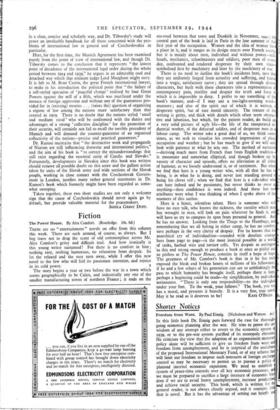Fiction
The Power House. By Alex Comfort. (Routledge. 10s. 6d.)
THERE are no " entertainment " novels on offer from this column this week. There are such around, of course, as always. But I beg leave not to drag the scent of old commonplace across Mr. Alex Comfort's gritty and difficult trail. And how ironically is this young writer surnamed! For there is no comfort in him ; nothing easy, nothing humorous, no relaxation from despair. So let the relaxed and the easy turn away, while I offer this new novel to the few who will feel its passionate intention, and rejoice in its cold power.
The story begins a year or two before the war in a town which seems geographically to be Calais, and industrially any one of the smaller manufacturing towns of northern "France ; it ends on the sea-road between that town and Dunkirk in November, 194u ; to, central part of the book is laid in Paris in the late summer of first year of the occupation. Women and the idea of woman hay a place in it, and it ranges as its design exacts over French society, but it is mainly about men, individual and without power—mill. hands, mechanics, schoolmasters and soldiers, poor men of every. day, confronted and rendered desperate by their own time-. symbolised first by machinery and later by the machinery of war.
There is no need to Outline the book's incidents here, save tha they are uniformly forged from actuality and suffering, and beaten into a tragic, -satisfactory curve ' • they are spread through diverse characters, but built with these characters into a representation of contemporary pain, sterility and despair the with and force of which it is impossible to deny. I prefer to say something of the book's manner, and—if I may use a too-light-seeming word— manners ; and also of the spirit out of which it is written, a desperate spirit, but of rare moral sincerity. The texture of the writing is gritty, and thick with details which often seem obstruc- tive and laborious, but which, for the patient reader, do build up a very solid picture of ugly life—the life of the exasperated in. dustrial worker, of the defeated soldier, and of desperate men in a labour camp. The writer asks a good deal of us, we think some- times, as we seek to visualise his crowded impressions of place, occupation and weather ; but he has much to give if we will only look with patience at what he sets out. The method of narration —deriving much more from French than from English tradition is monotone and somewhat elliptical, and though broken up by variety of character and episode, offers no alleviation at all either of humour, as we loosely understand it, or of sentiment. But whe we find that here is a young writer who, with all that he has t bring, is in what he is doing, and never just standing around being his clever self ; when we find that here is a side-taker wh can hate Indeed and be passionate, but never thinks to sneer a anything—then confidence is won indeed. And these last tw attributes were what I was thinking of when I spoke above of th manners of this author.
Here is a bitter, relentless talent. Here is someone who will have no easy talk, who knows the sickness, the sterility which M3 has wrought in man, will look on pain wherever he finds it, and will have us try to compass its span from personal to general. An he has no answer. Looking from the Thugs to the Humbugs, an remembering that we all belong in either camp, he has no comfor save perhaps in the very clarity of despair. For he knows that hi anarchical cry of individualism—sounded with desolate courag here from page to page—is the most ironical possible in a wort of tanks, barbed wire and torture cells. Yet despair as astringen as this and strong enough to produce a book at once so pitiful an so pitiless as The Power House, contains in itself a hope of hop The greatness of Mr. Comfort's book is that in it he has trot exposed the bleak and broken hearts of millions of his fellowmen if he and a few others of his generation can see so unblinkingly th pass to which humanity has brought itself, perhaps there is ho perhaps a beginning could be made—by simplification, by individu seriousness. "There is only one responsibility—to the indiviilu under your feet_ To the weak, your fellows." The book, you se has a moral, and presents it bravely. It is a very fine, true move May it be read as it deserves to be! KATE O'BatEN.


























 Previous page
Previous page